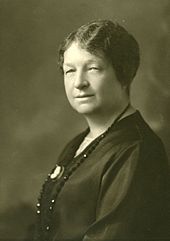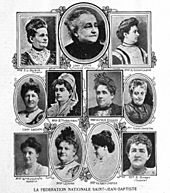Marie Lacoste Gérin-Lajoie facts for kids
Marie Lacoste Gérin-Lajoie (born October 19, 1867 – died November 1, 1945) was a Canadian woman who worked for women's rights. She taught at the Université de Montréal. She also taught herself about law, using books from her father and husband, who were both lawyers. Marie was a leader in the women's rights movement in Québec. She helped start the Fédération nationale Saint-Jean-Baptiste in 1907. This group worked to get more social and political rights for women.
Contents
Marie's Early Life
Marie Gérin-Lajoie was the daughter of Marie-Louise Globensky and Alexandre Lacoste. Her family was wealthy and Catholic. Marie studied a lot on her own, especially about women's history and law. She married a lawyer named Henri Gérin-Lajoie when she was 20. She agreed to marry him only if he let her keep working for women's rights. They had four children together.
How Marie Learned
Marie was born into a well-off family because her father, Alexandre Lacoste, had a successful career. When she was young, she went with her mother to charity events for rich people. At these events, she learned about problems like poverty. She also saw that women often couldn't control their own futures.
At nine years old, she went to a convent school in Hochelaga. She finished school there in 1883 when she was fifteen. At that time, there were no French Catholic university programs for women in Quebec. But Marie loved to learn. She kept studying in her father's large library. She read about many things, from physics to old classic books. Later, she studied law and became an expert on her own.
Marie's Work for Women
A main idea that guided Marie Gérin-Lajoie's work was that civil law was very unfair to women, especially married women. Back then, when a woman got married, her husband would become her legal guardian instead of her father. She would have very little legal power. She also couldn't make decisions for herself. This made women depend on men, which Marie thought was wrong.
Important Groups Marie Joined
Montreal Local Council of Women (MLCW)
In 1893, Marie Gérin-Lajoie joined the Montreal group of The National Council of Women of Canada (NCWC). This was her first time joining an organized group that saw women's rights as very important. However, it was not easy to be part of an English-speaking group in a mostly Catholic province. In the MLCW, she helped lead campaigns to let more women vote in Montreal city elections. She also worked to protect the rights of women workers. She fought for women to have the right to go to college and to have jobs. Her time in the MLCW and her interest in law inspired her to write a book called Traité de Droit usuel in 1902.
Fédération Nationale Saint-Jean-Baptiste (FNSJB)
After gaining experience with the NCWC, Marie Gérin-Lajoie wanted to create a group for women's alliances. She believed that with the FNSJB, she could encourage more women to do charity work. She thought this would help fix the problems women faced. The FNSJB was started in 1906. Marie was the group's secretary until 1913. This Federation was an early supporter of women's right to vote in provincial elections. Besides its legal work, the Federation also helped with social issues. They provided milk for children and mothers. They fought against alcoholism and illness. They also raised awareness about babies dying young, and other issues affecting women's lives.
Provincial Franchise Committee
Marie Lacoste Gérin-Lajoie and the president of the MLCW created the Provincial Franchise Committee. This committee led a group to Québec City in 1922. They went to support a new law that would give women the right to vote. However, the law did not pass. Marie stepped down from her role as head of the French-speaking part of the committee that same year.
Other Things Marie Achieved
Besides working for more legal rights for women, Marie Gérin-Lajoie also pushed for French-language university education for women in Quebec. Partly because of her actions, the Catholic church leaders in Quebec agreed to open the first French-speaking women's college in 1908.
l'École Enseignement Supérieur pour les Jeunes Filles
In 1908, Marie Lacoste Gérin-Lajoie put pressure on Archbishop Paul Bruchési. She then helped start l'École Enseignement Supérieur pour les Jeunes Filles. This was a college for girls run by the sisters of the Congrégation de Notre-Dame de Montréal. It was connected to what is now Université de Montréal. In 1911, her daughter, also named Marie Gérin-Lajoie, graduated from this college. This made her the first French Canadian woman to earn a Bachelor of Arts degree in Québec.
Marie's Faith and Its Impact
Marie Gérin-Lajoie was different from some English-speaking women who worked for rights. She had a very strong Catholic background. She was educated in a convent for part of her life. She believed that the way women were treated in law and society was unfair. Even though church leaders often taught that women were "less important" than men, she never stopped believing that women should be educated. She also believed women were fully capable of any smart activity. She thought about this difference between her beliefs and the church's teachings. She decided that Jesus came to save all souls on Earth. This is because only souls—not women or men—appear before God.
Marie's Lasting Impact
Quebec was the last Canadian province to give women the right to vote, which happened in 1940. In 1929, Marie Gérin-Lajoie spoke about women's rights to the Dorion Commission. In 1931, the Quebec Civil Code was changed to include the things Marie Gérin-Lajoie had been fighting for. In 1998, she was named a Person of National Historic Significance by the Historic Sites and Monuments Board of Canada.



